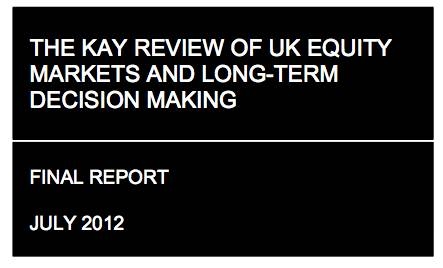The review 'UK equity markets and long-term decision making' began in June 2011 to focus on how the UK equity markets were performing.
Professor John Kay, from the London School of Economics, focused on how the markets enable the performance of UK companies and enable investors to benefit from this via returns from equity investment.
Prof Kay said: "A lack of trust and poorly aligned incentives have helped create a culture of short-termism in our financial markets. This is undermining their role of supporting innovative, sustainable long-term business performance.
"We must create cultures where business and finance can work together to create high-performing companies and earn returns for investors on a sustainable basis. This means moving away from a focus on short-term transactions and trading to an environment based on long-term trust relationships."
He recommended the Government and regulators:
• Improve the incentives and quality of engagement, including establishing an Investor Forum to foster more effective collective engagement by investors with UK companies.
• Restore relationships of trust and confidence in the investment chain, including applying fiduciary standards more widely within the investment chain.
• Change the culture of market participants, including by adoption of 'good practice statements' by company directors, asset managers and asset holders that promote a more expansive form of stewardship and long-term decision making throughout the investment chain.
• Realign incentives by better relating directors' remuneration to long-term sustainable business performance and better aligning asset managers' remuneration to the interests of their clients.
This is the latest campaign for trust in the industry following Shane Mullins' Question of Trust campaign which was publicly launched earlier this month.
• Want to receive a free weekly summary of the best news stories from our website? Just go to home page and submit your name and email address. If you are already logged in you will need to log out to see the e-newsletter sign up. You can then log in again.

